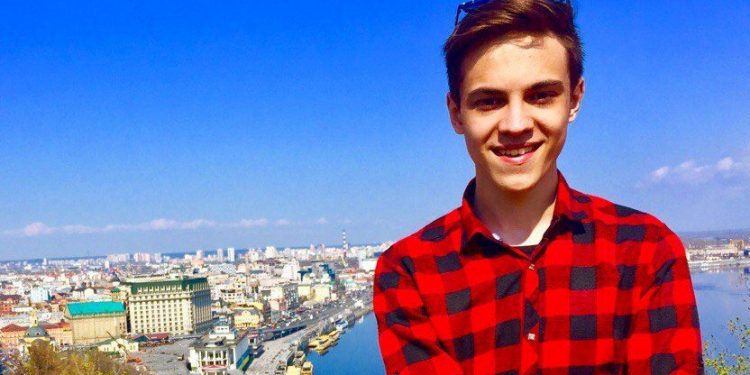Artem Derkachov, a television journalist from Bakhmut, had planned to intern at a Kyiv channel on February 24, 2022, but instead found himself in a shelter due to the conflict. Instead of being behind the camera, he was packing food for soldiers, emergency service workers, and ordinary Kyiv residents.
Artem Derkachov was born in the town of Bakhmut in the Donetsk region. He became interested in journalism during school, and his childhood dream eventually became a reality. He began by writing articles for a local newspaper and later became a correspondent for the well-known regional channel Bakhmut TV. A few weeks before the full-scale invasion, Artem set off for an internship in the capital.
— On February 24, I was supposed to have my first day at work. It’s quite symbolic that I was supposed to film a segment about shelters, but instead of going to the shoot, I went into a shelter to save my life. Honestly, it was scary. In 2014, Bakhmut experienced a ‘minor scare,’ but this time, everything was different— Artem begins his story.
The collaboration with the television channel didn’t materialize due to the conflict; it was shut down. Artem became a volunteer, packing and distributing food at a fast-food establishment in Kyiv. While doing this, he continued searching for work and eventually became a correspondent for the nationwide channel Rada. During the first months of the full-scale war, he lived at work.
— We turned our office into a sort of camp. We worked, lived, and cooked food here. Some even brought their children here because an underground parking lot served as a good shelter,— the journalist explains. — We also set up a studio to continue broadcasting even during air raid alarms. We took shifts: one team for five days and another for five days. But some stayed for weeks because commuting was far and often dangerous.
Many of his colleagues became war correspondents; some took up arms instead of cameras and microphones.
— Our cameraman went to the front. Nobody forced him; he decided himself. He just felt that he was needed there. There are many stories like that. And it’s invaluable. We have to fight for our rights, our freedom, and our cities,— our interlocutor says.
His hometown, Bakhmut, has been almost wholly destroyed. Since intense shelling began there, Artem has been restless, as his parents still reside there.
— It hurts, and it hurts badly. I never thought I’d watch the news and see my city in ruins. Maybe Ukraine didn’t know much about Bakhmut, but people from the Donetsk region knew it well because it was a cultural center. It was cozy there, especially with our rose alleys. Now the world knows about Bakhmut but at such a terrible cost! — Mr. Derkachov recounts. — It’s harrowing to see how residential buildings are shelled where people are living… I know that over 8-10 thousand people are still there, including children. I was fortunate to take my parents out; they now live in Brovary. There’s a hospital where doctors from Bakhmut can work, and my parents found jobs there too. Our family wants to return home, but we understand it won’t happen anytime soon.
Artem is currently completing his university studies, participating in various grants to support young professionals, and believes in Victory.
— I’m confident that people will take to the streets, hug each other, sing. I want to continue working in journalism because I live for it. I’ve had to work in different fields before, and then I realized that I would definitely return to journalism because it’s an incredibly cool and multifaceted profession, and it’s truly important. Today we write about defending the country, and together we’ll tell the story of how our Ukraine is being rebuilt and reborn, — Artem Derkachov emphasizes confidently.
This series, titled Executed Free Speech, is created as part of a project Drawing Ukrainian And International Audience’s Attention To Serious Violations Of Human Rights And Crimes Against Journalists And Mass Media By The Russian Federation, which is performed by the National Union of Journalists of Ukraine, with support from the Swedish non-profit organization Civil Rights Defenders.
JOURNALISTS ARE IMPORTANT. Stories of Life and Work in Conditions of War is a cycle of materials prepared by the team of the NUJU with the support of the Swedish human rights organization Civil Rights Defenders.
#CRD

 THE NATIONAL UNION OF
JOURNALISTS OF UKRAINE
THE NATIONAL UNION OF
JOURNALISTS OF UKRAINE
















Discussion about this post